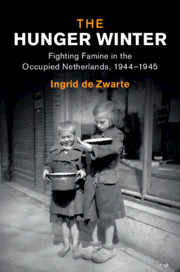Book contents
- The Hunger Winter
- Studies in the Social and Cultural History of Modern Warfare
- The Hunger Winter
- Copyright page
- Dedication
- Contents
- Illustrations
- Figures
- Maps
- Tables
- Acknowledgements
- Abbreviations
- Maps
- Introduction
- 1 Historical Contexts
- 2 Causes of the Famine
- 3 Effects on Mortality, Fertility, and Health in Later Life
- 4 Central Government and Food Administration
- 5 The Politics and Practices of Allied Relief
- 6 Coping at Household and Individual Levels
- 7 Community Strategies
- 8 The Evacuation of Children
- Conclusion
- Appendix: Timeline of Important Events
- Bibliography
- Index
Conclusion
Published online by Cambridge University Press: 04 July 2020
- The Hunger Winter
- Studies in the Social and Cultural History of Modern Warfare
- The Hunger Winter
- Copyright page
- Dedication
- Contents
- Illustrations
- Figures
- Maps
- Tables
- Acknowledgements
- Abbreviations
- Maps
- Introduction
- 1 Historical Contexts
- 2 Causes of the Famine
- 3 Effects on Mortality, Fertility, and Health in Later Life
- 4 Central Government and Food Administration
- 5 The Politics and Practices of Allied Relief
- 6 Coping at Household and Individual Levels
- 7 Community Strategies
- 8 The Evacuation of Children
- Conclusion
- Appendix: Timeline of Important Events
- Bibliography
- Index
Summary
In words both emotional and emphatic, Dutch historian Ernst Kossmann concluded the following about the Hunger Winter: ‘Never in its history did Holland have to consider the downfall of its people and the destruction of its civilization as seriously as it had during the final months before May 1945.’1 Over the last 75 years, both popular and scholarly discourses have cultivated powerful myths about the Hunger Winter, the most important ones being the brutal policy of starvation by the German occupier and the miraculous rescue by the Allied food drops. In literature, these myths seem informed by the assumption that the Dutch Hunger Winter is comparable to other food crises and famines caused by Nazi hunger politics. At the national level, the perseverance of these misconceptions stems from a long process of delegitimisation of the German occupier on the one hand, and the internalisation of gratitude towards the Allies on the other – processes that started right after liberation and became a central foundation for nation-building in Dutch post-war society. Through mutual influences, over time these dominant narratives have become aligned with both individual and collective memories of the German occupation in an attempt to give meaning to experiences of war, occupation, and hunger.
- Type
- Chapter
- Information
- The Hunger WinterFighting Famine in the Occupied Netherlands, 1944–1945, pp. 257 - 264Publisher: Cambridge University PressPrint publication year: 2020

